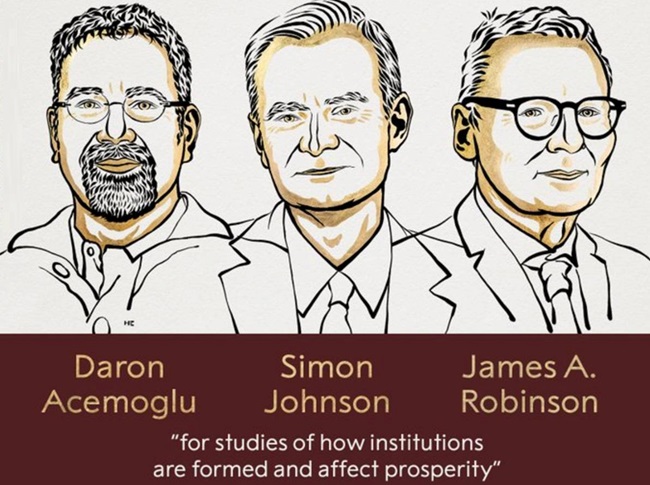| (Main Exam, General Studies Paper-3: Economy and Planning, Topics Related to Resource Mobilization, Growth, Development and Employment) |

Reference:
The Nobel Prize in Economics for the year 2024 has been awarded to American economists Daron Acemoglu, Simon Johnson and James A. Robinson. They have been given this award for the study of how institutions are built and how they affect prosperity. They have promoted the understanding of the root causes of the success or failure of countries.
Effect of Social Institutions on Differences in Prosperity:
- The Industrial Revolution has led to an 'extreme divergence' in the standard of living between the East and the West. Various theories have been proposed to explain the great difference in the standard of living in rich versus poor countries.
- Some people have considered Western colonialism as the main reason for the prosperity of the Western world. However, some scholars argue that inequalities in natural resources are the reason for the difference in economic prosperity in different countries.
- There is also an argument that intelligence and even historical events can explain a nation’s prosperity.
The Evolving Interrelationship between Social Institutions and Prosperity:
- According to the Nobel Committee, today the richest 20% of countries in the world are 30 times richer than the poorest 20% in terms of average income.
- This year’s Nobel Prize winners argue that differences in the quality of economic and political institutions best explain differences in economic prosperity between countries.
- This theory is most famously elaborated in the 2012 book Why Nations Fail: The Origins of Power, Prosperity and Poverty by Daron Acemoglu and James A. Robinson.
- This is also explained in a 2004 paper ‘Institutions as a Fundamental Cause of Long-run Growth’, co-authored by all three Nobel Laureates of this year.
- The Nobel Prize in Economics is often awarded for groundbreaking academic research on topics that are important in the real world. For example, in the last two years, the Nobel Prize has been awarded to scholars who have worked on important questions such as the gender pay gap and the fragility of the banking system.
The importance of the quality of institutions:
- According to Douglass North, Nobel Laureate and pioneer of New Institutional Economics, institutions are the ‘rules of the game’ that define the incentives individuals have when dealing with each other.
- For example, institutions that prevent the state from confiscating the property of honest citizens will encourage ordinary citizens to work hard without fear of confiscation and in turn lead the nation to economic prosperity.
- On the other hand, institutions that legitimize confiscation will negatively affect individual incentives and lead to economic stagnation.
- Acemoglu and Johnson argued in their book that institutions can be either ‘inclusive’ or ‘absorbent’.
- Inclusive institutions are characterized by the right to protect private property and democracy while exploitative institutions are characterized by insecurity of private property and lack of political freedom.
- They tried to demonstrate empirically that inclusive institutions lead to long-term economic growth and higher standards of living while exploitative institutions lead to economic decline and poverty.
- For this, they studied the types of institutions established by colonists in different colonies and their effects on the long-term economic fortunes of these colonies.
- When a colonial power did not want to settle in a certain country due to various reasons (e.g. high mortality rates due to geography), it set up institutions that were exploitative in nature and detrimental to long-term economic development.
- This may have been the case in India where the British set up institutions that were mostly designed to plunder maximum resources in the short term rather than promote long-term economic development.
- However, in countries where colonists wanted to settle for the long term, they set up inclusive institutions that encouraged investment and long-term economic development rather than short-term plunder.
- This may have been the case in the US where the British set up inclusive institutions that promoted long-term economic prosperity.
- Should be noted that institutions may also include factors such as culture that influence the more obvious ‘rules of the game’ expressed by political and economic institutions.
Reasons for lack of inclusive institutions despite being crucial for development:
- The Nobel laureates have also shed light on why more countries in the world have not adopted ‘inclusive institutions’, which are crucial for long-term economic growth.
- They attribute this to the different options available to rulers in their respective countries. When rulers of a country are able to safely extract sufficient resources for their private benefit through exploitative institutions, they have no reason to undertake political and economic reform (or inclusive institutions) that would benefit the wider population in the long run.
- In such a case, exploitative institutions may indeed persist for a long time, unless the masses revolt against the status quo. However, if there is a real threat of mass revolt against exploitative institutions, at least some rulers may give in to popular demand and reluctantly establish more inclusive institutions that help economic growth.



